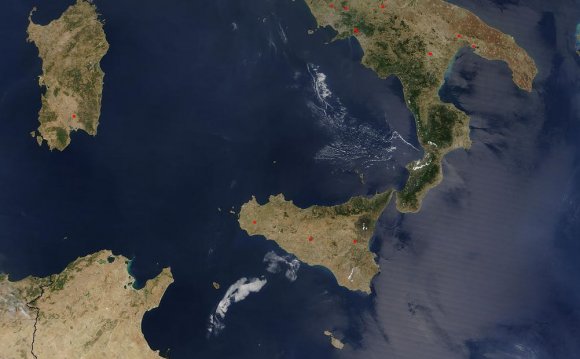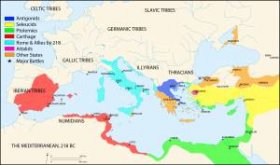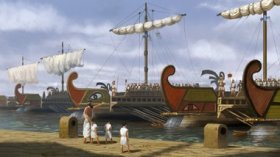
 The Mediterranean Sea is a sea connected to the Atlantic Ocean surrounded by the Mediterranean region and almost completely enclosed by land: on the north by Anatolia and Europe, on the south by North Africa, and on the east by the Levant. The sea is technically a part of the Atlantic Ocean, although it is usually identified as a completely separate body of water. The name Mediterranean is derived from the Latin mediterraneus, meaning "inland" or "in the middle of the earth" (from medius, "middle" and terra, "earth"). It was an important route for merchants and travelers of ancient times that allowed for trade and cultural exchange between emergent peoples of the region — the Mesopotamian, Egyptian, Phoenician, Carthaginian, Iberian, Greek, Macedonian, Illyrian, Thracian, Levantine, Gallic, Roman, Albanian, Armenian, Arabic, Berber, Jewish, Slavic and Turkish cultures.
The Mediterranean Sea is a sea connected to the Atlantic Ocean surrounded by the Mediterranean region and almost completely enclosed by land: on the north by Anatolia and Europe, on the south by North Africa, and on the east by the Levant. The sea is technically a part of the Atlantic Ocean, although it is usually identified as a completely separate body of water. The name Mediterranean is derived from the Latin mediterraneus, meaning "inland" or "in the middle of the earth" (from medius, "middle" and terra, "earth"). It was an important route for merchants and travelers of ancient times that allowed for trade and cultural exchange between emergent peoples of the region — the Mesopotamian, Egyptian, Phoenician, Carthaginian, Iberian, Greek, Macedonian, Illyrian, Thracian, Levantine, Gallic, Roman, Albanian, Armenian, Arabic, Berber, Jewish, Slavic and Turkish cultures.
The history of the Mediterranean region is crucial to understanding the origins and development of many modern societies. Friedrich Hegel said about the Mediterranean: "For the three quarters of the globe, the Mediterranean Sea is similarly the uniting element and the centre of World History." Two of the first commonly noted human civilizations began near the eastern Mediterranean sea. Common rhetoric suggests that Civilization first developed in Mesopotamia beginning with Sumer in the 4th millennium BCE. Soon after, the Nile River valley of ancient Egypt was unified under the Pharaohs in the 4th millennium BCE, and civilization quickly spread through the Fertile Crescent to the east coast of the sea and throughout the Levant, which happens to make the Mediterranean countries of Egypt, Syria, Lebanon, Palestine and Israel part of the cradle of civilization. These areas shared similar climates and geographies, but it was more difficult to spread technologies and crops, such as flax, lentil, peas, barley, and cotton to other portions of the Mediterranean basin. In time, large empires developed in Asia Minor, such as the Hittites. The main expansion was delayed until ships sturdy enough to cross the sea were developed. Cyprus and the other islands developed, and the Minoan civilization flourished on the island of Crete. While the river valley civilizations always had larger populations, the trading societies on the coast of the sea soon became the most prosperous, and rose to power.
Two of the most notable Mediterranean civilizations in classical antiquity were the Greek city states and the Phoenicians. The Greeks expanded throughout the Black Sea and south through the Red Sea. The Phoenicians spread through the western Mediterranean reaching North Africa and the Iberian Peninsula. They often provided the naval forces of the Achaemenid Persian Empire and their heartland in the Levant was still dominated by powers rooted east in Mesopotamia or Persia. In the northern-most part of ancient Greece, in the ancient kingdom of Macedonia, technological and organizational skills were forged with a long history of cavalry warfare. The hetairoi (Companion cavalry) was considered the strongest of their time. Under Alexander the Great, this force turned east, and in a series of three decisive battles, routed the Persian forces and took their empire, which included Egypt and the Phoenician lands. The major centres of the Mediterranean at the time became part of Alexander's empire as a result. His empire quickly disintegrated, and the Middle East, Egypt, and Greece were soon again independent. Alexander's conquests spread Greek knowledge and ideas throughout the region. These eastern powers soon began to be overshadowed by those further west. In North Africa the former Phoenician colony of Carthage rose to dominate its surroundings with an empire that contained many of the former Phoenician holdings.

However, it was a city on the Italian Peninsula, Rome, that would eventually dominate the entire Mediterranean basin. Spreading first through Italy, Rome defeated Carthage in the Punic Wars, despite Hannibal's famous efforts against Rome in the Second Punic War. After the Third Punic War, Rome then became the leading force in the Mediterranean region. The Romans soon spread east taking Greece, and the Greek heritage played an important role in the Roman Empire. By this point the coastal trading cultures were thoroughly dominant over the inland river valleys that had once been the heart of the great powers. Egyptian power moved from the Nile cities to the coastal ones, especially Alexandria. Mesopotamia became a fringe border region between the Roman Empire and the Persians. When Augustus founded the Roman Empire, the Mediterranean sea began to be called Mare Nostrum (literally:"Our Sea") by the Romans. Their empire was centered on this sea and all the area was full of commerce and naval development. For the first time in history an entire sea (the Mediterranean) was free of piracy. For several centuries the Mediterranean was a "Roman Lake", surrounded on all sides by the empire. One portion of the empire was Judea, and in time, a religion founded here Christianity, spread throughout the empire and eventually became its official faith. The empire began to crumble, however, in the fifth century and Rome collapsed after 476 CE. Temporarily the east was again dominant as the Byzantine Empire formed from the eastern half of the Roman one. The western part of the empire, Gaul, Iberia, and the Maghreb were invaded by nomadic horse peoples from the Eurasian steppe. These conquerors soon became settled, and adopted many of the local customs, forming many small and warring kingdoms.
https://www.reddit.com/r/SideProject/comments/1jr6qm9/my_new_project_a_free_gps_speedometer_id_love/
YOU MIGHT ALSO LIKE












